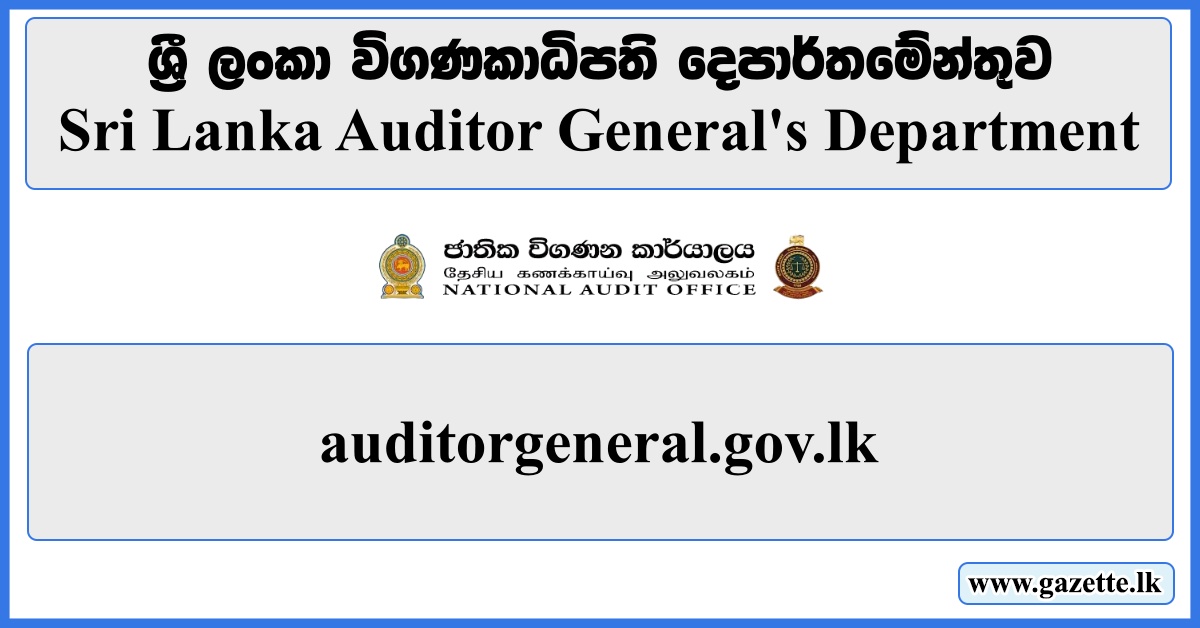The Department of the Auditor General in Sri Lanka is critical in the establishment of transparency, integrity, and accountability among institutions of the public sector. This department as the supreme audit institution in the country audits use of the public funds and makes sure that the financial resources are utilized lawfully, efficiently and effectively. Its activities boost the trust of the people to the government institutions and good governance.
Here is a guided tour in which we shall have an insight into several of the responsibilities with the department, its services, contact details, e-services, and frequently asked questions.
Auditor General’s Department
Auditor General Department (AGD) came into being under constitutional authority to the Article 153 of the Constitution of the Democratic Socialist Republic of Sri Lanka. It is independent to audit and report on the financial and performance matters of the government and public institutions like the ministries, departments, provincial council, local authorities, and the public enterprises amongst others.
The department is run under the Auditor General, nominated by the President of Sri Lanka and is accountable to the parliament enhancing the independence and objectivity of the department.
Auditor General’s Department Overview and Contact Information
| Address | National Audit Office, 306/72, Polduwa Road, Baththaramulla, Sri Lanka. |
| Telephone | +94 11 2887028/9, +94 11 2887030/1/2/3/4 |
| Hotline | 1919 |
| Fax | +94 11 2887223 |
| info@agd.gov.lk | |
| Website | auditorgeneral.gov.lk |
Core Responsibilities of the Auditor General’s Department
The AGD is tasked with several vital responsibilities under the constitution and auditing standards. Its core functions include:
1. Financial Audits
- Examination of financial statements of government entities to ensure accuracy and compliance with applicable standards.
- Verification of the legality and propriety of financial transactions.
2. Performance Audits
- Assessment of whether public entities are achieving their objectives efficiently, effectively, and economically.
3. Compliance Audits
- Making sure that government departments and institutions observe the available laws, regulations, and procedures.
4. Reporting to Parliament
- Reporting audit findings to Parliament using Committee on Public Accounts (COPA) and the Committee on public enterprises (COPE).
Pointing out the anomalies and non-productive factors, as well as the suggestions aimed at improving it.
5. Advisory Services
- Providing guidance to auditees on improving internal controls, risk management, and governance frameworks.
6. Special Investigations
- Conducting special audits and investigations on misuse of public funds or financial mismanagement when requested by Parliament or other authorities.
E-Services and Digital Initiatives
The Auditor General’s Department has embraced digital transformation to enhance transparency and public access to information. Some of the key e-services include:
Online Audit Reports Access
Special audit reports together with annual audit reports are available to download on the official site by citizens. This promotes accountability to the people and enables stakeholders to be up-to-date.
E-Recruitment Portal
Job seekers can access government audit career opportunities and submit applications online.
E-Library and Publications
Audit manuals, guidelines and past audit reports that are of special value to researchers, students and auditors are available at the site.
Institutions Audited by the Department
The AGD audits a broad range of institutions across all levels of government, including:
- Ministries and government departments
- Provincial councils and local authorities
- Public corporations and statutory boards
- Universities and affiliated institutes
- Foreign-funded projects
- Semi-governmental institutions receiving public funds
Role in Promoting Good Governance
Auditor General Department is one of the pillars in ensuring good governance in SL through the following ways:
- Livability creates accountability of the many in the position of power and influence, where it comes to financial decisions.
- Avoiding corruption, wastes and inefficiency
- Promoting economical use of government funds
- Evidence-based policymaking and audit findings Supporting
Its reports tend to result in policy changes, disciplinary penalties and even criminal cases when there is gross misuse of money.
Independence and Integrity
The independence of the Auditor General is one of the peculiarities of the Auditor General Department. It is not answerable to the ministry like other institutions of the public sector. This independence helps AGD to execute its work in an objective, transparent and without political interference.
The department conforms to International Standards of Supreme Audit Institutions (ISSAIs), and therefore its operations are internationally benchmarked.
Training and Capacity Building
The AGD makes great investments in the process of professional enhancement of its employees:
- A series of regular training workshops and seminars
- Co-operations abroad with audit bodies (e.g., INTOSAI, ASOSAI)
- IT audit capacity building, forensic audit capacity building and performance review capacity building
The activities make sure that the auditing practice in Sri Lanka is not out-dated.
What Is the NAO Membership Area?

The referred to as the Auditor General department (and also the so-called National Audit Office) web page made available a number of eye-catching web pages (probably all the pages of the web site) called the NAO Members Area. It is an interactive online portal used by internal personnel as well as authenticated external individuals to access and work with the detailed audit information and documents. This is an out-lined summary:
- It is a secured section of the Auditor General’s Department website, titled “NAO Members Area – Online Service”
- Access is typically through login credentials —this area is not publicly open for general browsing.
Key Features & Functions
Within the NAO Members Area portal, members can:
- Search and retrieve audit reports across multiple years—from 2008 up to at least 2025
- Filter by:
- Audit year (e.g., 2008, 2010, … 2025)
- Audit type (e.g. Financial, Performance, Environmental, Special, Computer‑Aided Audit Technique, Tri‑Annual, Foreign Funded Projects)
- Sector classification (e.g. Ministries & Departments, Provincial Councils, State Corporations, Local Authorities, etc.)
- Quick‑links to Public Representation, Procurement Guidelines, Prathibha magazine, Service Minutes, and other staff-specific resources
Purpose & Users
- Mainly department officials, audit staff (as well as members of COPE/COPA), policy makers and perhaps external stakeholders with authorized access.
- Once it enables the secure access of granular audit information that is not entirely in the public domain.
Public vs. Members Access
- Public site: The general portal offers annual audit reports, special reports, and publications available for anyone to download.
- NAO Members Area: Restricted access, offering filtered advanced search, internal documentation, and resources tailored for users with a valid login
How It Works (User Experience)
- Navigate to the “NAO Members Area” link via the official website.
- Log in using your assigned username and password.
- Once logged in, use the dropdown filters to:
- Choose the audit year
- Select audit type
- Pick the sector or institute concerned
- Generate a list of matching audit reports and then view or download full documentation.
Why It Matters for Stakeholders
- Transparency and Traceability: Authorized parties will be able to trace audit history, analyze trends and compare past performance.
- Efficiency: The categorized access makes it very easy to access documents that are related to particular areas of auditing.
- Confidentiality: Some audit materials and internal guidelines remain accessible only to vetted members.
- Capacity-building: Staff use it for accessing training materials such as manuals, guidelines, and procurement documents (Prathibha magazine, service minutes, etc.).
Summary Table
| Feature | Description |
|---|---|
| Purpose | Secure retrieval of detailed audit documents |
| Who Uses It | AGD staff, parliamentary committees, vetted external users |
| Content | Reports (2008–2025), sector filters, audit type filters, internal resources |
| Access Method | Login-based portal via official website |
| Value | Enhances efficiency, oversight, and traceability for audits |
Frequently Asked Questions (FAQs)
1. Is the Auditor General independent of the government?
Yes. The Auditor General is a constitutional officer appointed independently and is not subject to the control of any ministry.
2. Can the public access audit reports?
Yes. All finalized audit reports are available on the department’s official website under the publications section.
3. How can I submit a complaint or report irregularities?
You can write directly to the Auditor General or email complaints to info@auditorgeneral.gov.lk. Some complaints may also be submitted through Parliament or other oversight bodies.
4. What are the requirements to take a job at the AGD?
Candidates usually require degrees in public administration, physics, accountancy or finance, and economics. The advertisements are made open on the department and government gazettes.
5. What is COPE and COPA committees and what is role of the Auditor General?
The Auditor General gives reports and technical advice to these parliamentary committees that assist them to inquire abnormalities and make institutions answerable.
6. Who has the Authority to access the NAO Members Area?
A: Only people involved are those who are authorized like members of the audit department, members of the parliamentary committee and other external stakeholders who have been thoroughly screened.
7. Why I cannot see these audit reports publicly?
A: The Members Area hosts the internal documentation or thorough information, which is not meant to be distributed widely without the limitation.
8. Is registration required to use the portal?
A: Yes, login credentials are necessary and issued by the Auditor General’s Department.
9. Does the portal include all audit types?
A: Yes — including financial, performance, environmental, special audits, and those conducted using computer‑aided techniques across sectors.
10. Is it updated with the latest audits?
A: Based on search interface availability up to year 2025, it appears regularly updated
Conclusion
The Auditor General Department of Sri Lanka is a champion of accountability to the people because tax payers of the country can now be sure that their money is spent sensibly, legally and efficiently. It still ensures financial discipline and integrity in the public sector by maintaining a high level of audit effort and reporting transparency and being independent in the processes of auditing.
As a policy-maker, a student, an individual seeking employment or a citizen with a concern, it is important to know what is in the role of the Auditor General Department to enable you to act in the governance of the same in a more informed manner.


